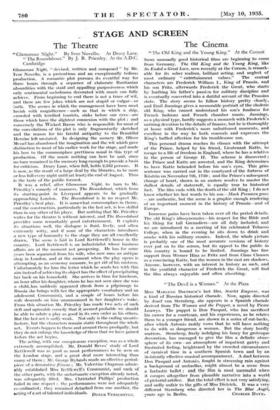The Cinema
"The Old King and the Young King." At the Curzon.
SOME unusually good historical films arc beginning to come from Germany. The Old King and the Young King, like So Ended a Great Lore, seen recently at the Curzon, is remark- able for its sober realism, brilliant acting, and neglect of most ordinary "entertainment values." The central characters are Frederick William I., King of Prussia, and his son Fritz, afterwards Frederick the Great, who starts by loathing his father's passion for military discipline and is eventually converted into a dutiful servant of the Prussian state. The story seems to follow history pretty closely, and Emil Jannings gives a memorable portrait of the choleric old King, who cannot understand his son's fondness for French fashions and French chamber music. Jannings, as a physical type, hardly suggests a monarch with Frederick's untiring devotion to the details of finance, but he is thoroughly at home with Frederick's more unbuttoned moments, and excellent in the way he both conceals and expresses . the King's baffled affection for his troublesome son.
This personal drama reaches its climax with the attempt of the Prince, helped by his friend, Lieutenant Katte, to escape to a life of freedom in England, where he has a relative in the person of George II. The scheme is discovered.; the Prince and Katte are arrested, and the King determines to have Katte beheaded before his son's eyes. This grins sentence was carried out in the courtyard of the fortress of Kfistrin on November 7th, 1730; and the Prince's subsequent change of heart, shown in an austere resolve to master the dullest details of statecraft, is equally true to historical fact. The film ends with the death of the old King ; I do not know whether his last words to his son—Mach Preuszen grosz —are authentic, but the scene is a graphic enough rendering of an important moment in the history of Prussia—and of Europe.
Immense pains have been taken over all the period details. The old King's idiosyncrasies—his respect for the Bible and his liking for tall Grenadiers—are all duly included; and we are introduced to a meeting of his celebrated Tobacco College, when in the evening he sits down to drink and smoke with his military cronies. Indeed, the whole picture is probably one of the most accurate versions of history ever put on to the screen, but its appeal to the public in this country is bound to be limited. Jannings has fine support from Werner Hinz as Fritz and from Claus Clausen as a convincing Katte, but the women in the cast are shadows. Anyone, however, with an interest in history as such, and in the youthful character of Frederick the Great, will find the film always enjoyable and often absorbing.


































































 Previous page
Previous page